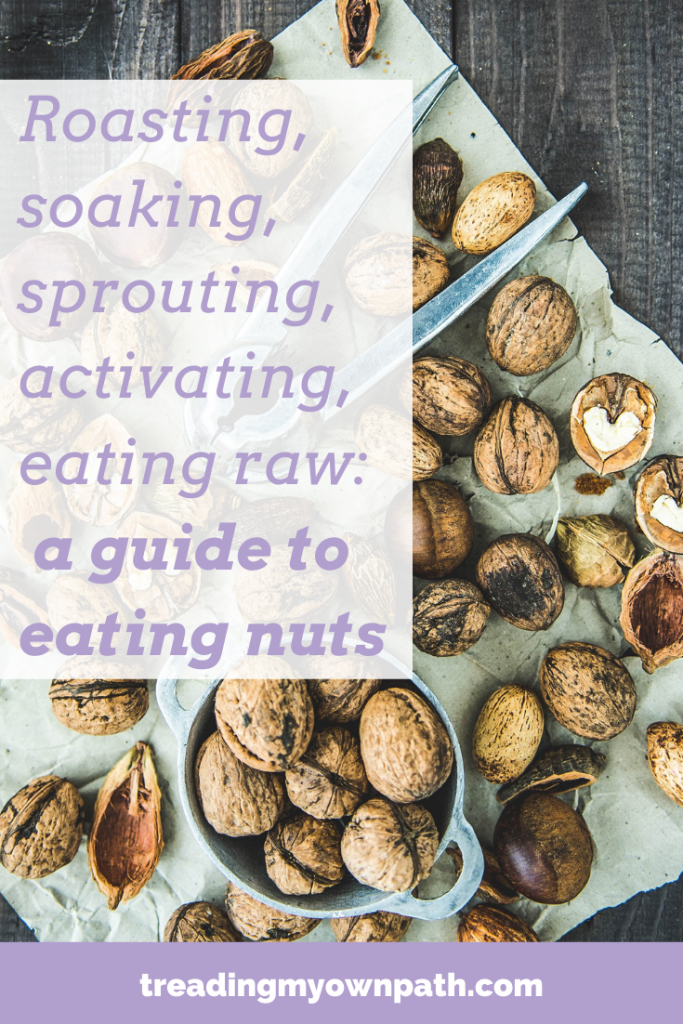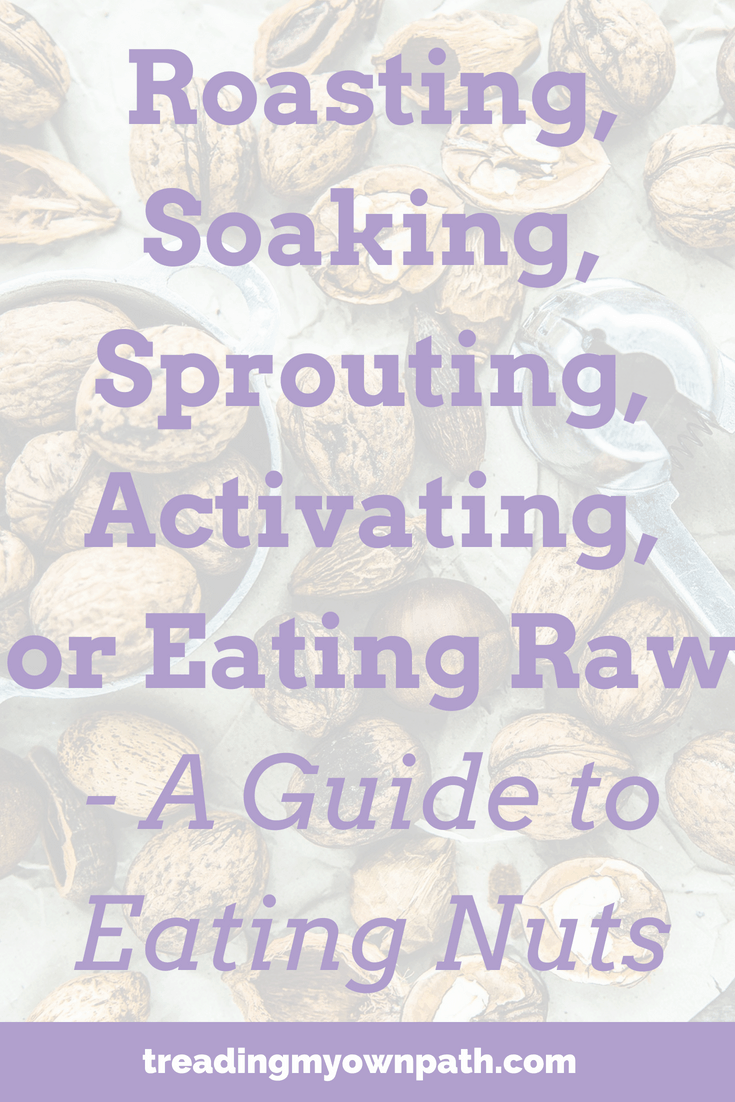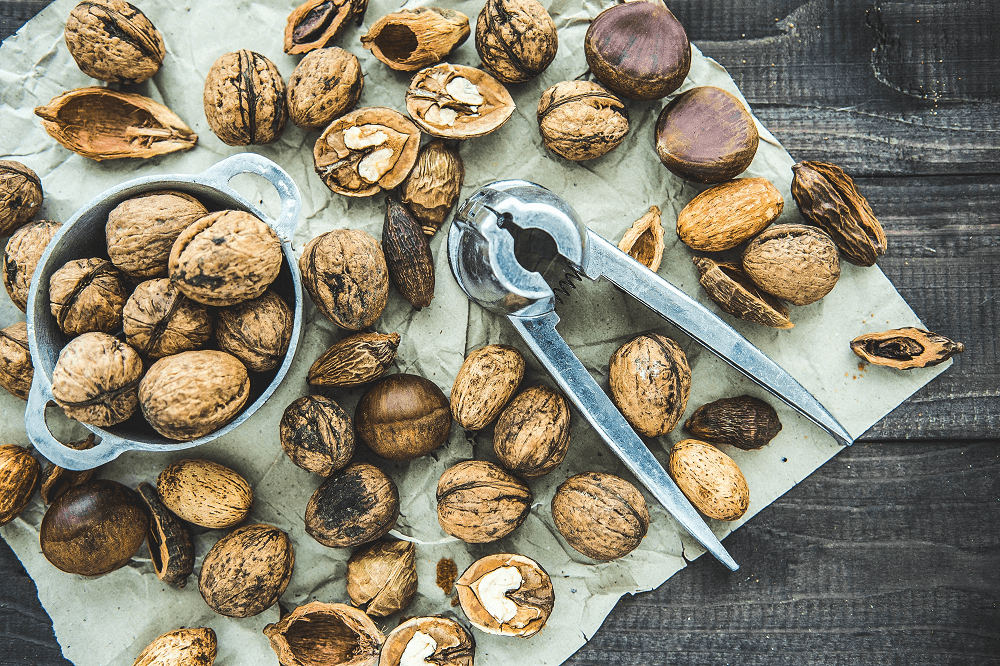Roasting, soaking, sprouting, activating, or eating raw – a guide to eating nuts
Nuts are super nutritious, and packed full of vitamins and minerals. Not only that, they are darn delicious. They’re surprisingly versatile ingredients too – they work equally well in sweet and savoury dishes, and you can even use them to make non-dairy milk, butter, and cheese. Plus they are used to make the most amazing raw desserts.
There’s a few different ways to buy nuts, but the two most common options are raw and roasted. As I’ve become more interested in learning about whole foods I’ve come across a lot of recipes that talked about soaking nuts, which seemed to add a lot of time to the recipes. When I started investigating raw food, and I found that the term “activated” also came up a lot, and recipes advised using activated nuts. How on earth do you activate a nut, I wondered? And more precisely, why would I bother when (most) nuts are perfectly tasty in their raw state?
The scientist in me wanted to know more. I like to understand things rather than following mindlessly just because I vaguely remember reading somewhere that something was better for me. I wanted to know what all these methods actually mean, what the point of them was, and whether there’s anything behind it.
Or is it just another fad?

Nuts in their natural state
Nuts grow on trees, and have a hard shell that takes a good set of nut crackers plus some considerable hand strength to prise open. Commercial farmers can use machinery to crack them open. The resulting nut once the case is removed is the raw nut.
It’s worth clarifying that raw in this instance means uncooked. Raw in the raw food sense means not heated above 46ºC. This can be a little confusing, for example with cashew nuts, which are often steamed open. These nuts are still referred to as “raw”, since they are uncooked, but they are not strictly speaking raw in the raw food sense as the steaming would have involved heating them above 46ºC. (You can buy cashews that have been cracked open by hand and are truly raw, but they are considerably more expensive.)
Nuts and phytic acid
As well as all their nutritional goodness, raw nuts also contain phytic acid, or phytate. Phytate is the molecule that plants use to store phosphorus, and it is particularly high in bran, seeds and nuts. Once digested, the phytate in raw nuts, which cannot be digested by humans as we do not have the phytase enzyme, binds to minerals, particularly calcium, iron, and zinc, but also magnesium and manganese, preventing us from absorbing them in the gastrointestinal tract. Phytate has been described as an anti-nutrient for this reason. (If you want to read more about phytate read here and here). Diets high in phytate are thought to cause iron deficiency (see here).
As well as binding to minerals, phytate is also thought to inhibit digestive enzymes such as pepsin (here), trypsin (here) and amylase (here). This is why large quantities of raw nuts can be hard to digest.
Whether you should worry about phytic acid depends on how much you intake. If you just eat a small handful of raw nuts a day, it’s probably no big deal. But if you’re vegan and eating huge quantities of almond butter, cashew cheese and raw (nut-based) cheesecake, you eat a vegetarian diet packed with lentils and wholegrains, or you’re anaemic or suffering from calcium or iron deficiency, then you may want to consider reducing your phytate intake. That doesn’t mean cutting back, it just means preparing your nuts (and also pulses and other wholegrains) a little differently.
All of the ways described below are ways of preparing nuts so as to reduce the phytate levels and make the nuts easier to digest, and allow us to absorb more nutrients.
Roasting Nuts
Roasted nuts are probably the most readily available nuts after raw nuts. Roasting reduces the phytate content of nuts, although there’s not much research available regarding specifics of how the nutritional content of nuts changes when you roast them. It is also thought to improve their digest-ability.
If you do want to eat roasted nuts, you’re far better off roasting your own. That way they’ll be fresher (and tastier), and you can control the oven temperature. Because nuts contain polyunsaturated fats it’s thought that roasting at lower temperatures are better. Also, nuts which contain asparagine, such as almonds, need to be kept below 130°C to avoid producing acrylamide, which is a neurotoxin and carcinogen. (For more information see here and here).
Roasted nuts that you buy from the supermarkets are often not roasted but deep fried. (If they don’t say dry roasted, then they’re not!) There ain’t nothing healthy about that!
Soaking nuts (or “activating” them)
Another option for reducing the phytate content of raw nuts is to soak them. Soaking is a precursor for germination, and the seed uses enzymes to break down the phytate. Soaking time can vary depending on which nut you’re soaking, but overnight is a general guideline.
If you soak the nuts for long enough, they should begin to sprout (germinate). I have never tried this but expect it would take several days. The water should be changed every 12 hours or so (more if it is a very hot day) to help prevent them rotting.
You can eat nuts that have been soaked. They are still crunchy but have a more “crisp” bite than a crunch. They are great for adding to salads or snacking on, but will only keep for a couple of days. They won’t work in recipes that call for raw or roasted nuts though because they are too wet. To enable them to be suitable for baking, they need to be dried out.
Dehydrating nuts
Dehydrating is a method of drying soaked nuts out without cooking them, and uses low temperatures for long periods of time to achieve this. There is a specialist piece of equipment called a dehydrator that can be used, or a fan oven at a low temperature (lower than 50ºC) with the door ajar to allow the moisture to escape, or even leaving them in the sun. Dehydrating nuts takes upwards of 12 hours. Once dried out the nuts resemble raw nuts in flavour and appearance but have more crunch and are slightly drier.
If nuts aren’t dehydrated for long enough then they can go mouldy inside because of the moisture that remains.
Activated nuts
In some health food shops you can buy activated raw nuts. These are nuts that have been soaked (activated) then dehydrated and packaged for sale. They are considerably more expensive than ordinary raw nuts because of the extra time and effort that has gone into preparing them.
The Conclusion?
All this preparation is taking place to make nuts easier to digest, and that can’t be a bad thing. That said, it does require a bit of effort, and if you don’t notice any problems eating raw nuts you’ll probably think it’s not worth the trouble. However, consider this. Whilst you may think it sounds like a modern fad, most traditional cultures soak, sprout and ferment nuts and grains and have done for centuries. It’s not that it’s been invented, more re-discovered. Also, nuts don’t come ready shelled in convenient packs at the supermarket. Back in the old days, if we wanted 500g of nuts for a recipe, we’d have to find a nut tree and then sit and crack them all open by hand ourselves. No doubt this helped limit how many we actually consumed. Nowadays we can consume kilos of them without a second thought. This makes it more important to prepare them properly than if we were just having a small handful now and then.
I try to soak my nuts if I’m adding them to a salad and planned far enough in advance! Soaking is a requirement for making nut milk anyway. As for raw desserts, because of the huge quantities of nuts required, I’ve started using activated walnuts and almonds because I can buy these in bulk. If I just want a quick snack though, I’ll often eat raw nuts straight out of the jar. Perfection is just too hard!
[leadpages_leadbox leadbox_id=1429a0746639c5] [/leadpages_leadbox]







This brought to mind the black walnut tree we had in the yard when I was growing up. Lots of people had the trees, and it was quite a job (and messy) to hull the walnuts each fall. It also took time to crack and pick the nuts, but they were delicious, and added to many recipes, holiday and otherwise. It’s a bit unusual to find black walnuts in the stores where I live now.
Hickory nuts are another local harvest that is no longer popular with anyone but squirrels.
That sounds so cool! I’d love to have nut trees in my garden. Maybe one day (sigh…) Guess I need a garden first!
Thank you for the wonderful tutorial and thorough research on preparing nuts. I soak some grains (mostly flour for sourdough), but not nuts. And I hadn’t thought about just how many nuts I consume compared to how many my (let’s say) grandmother ate. It’s probably way too many.
Thanks! Good to know I can teach you new things too – you’re constantly teaching me things!
I definitely eat far too many nuts. But they are delicious… : )
Well thank you! You do a lot of research for your posts. It really shows :)
i forgot my nuts were being soaked in the refrigerator and left them for 6 days! are they okay, can you dry nuts on top of stove as I do not have a dehydrator, yet that is. i plan to have one by wednesday, but is there a way to preserve the nuts until then??? did not do my usual research first. am getting the excalibur 9 tray dehydrator. pls provide a way to save my nuts!
There are a lot of people who recomend soaking and dehydrating nuts before eating them. You seem as engaged in both health and the environment as I am, so I post this question to you, hoping for a good answer :) Soaking the nuts is ideal for us to be able to eat them, but from a sustainable point of view… the dehydrating of them, doesn’t that require a lot of energy and how sustainable is that in the long run?
I’ve wondered about that myself! I don’t have a dehydrator, and wouldn’t get one unless I could run it on solar (and I don’t have solar panels). I use my oven on a low temp, or…the sun! You can build solar dehydrators, or just use a sunny spot outdoors : )
Can I sprout nuts that have been roasted? I have a bunch of roasted nuts and don’t want to eat them like that, I’d rather sprout them. But I don’t want to waste my time if they are already “dead”
Thank you!
Hi Anneliese, no, if they’re roasted you won’t be able to sprout them. They’re already “dead”, as you say!
I am a bit confused that some guides say roast walnuts at 150 for 12 hours, and others say 5 to 10 minutes at 350 degrees. After soaking the nuts overnight I did the 10 minute roast and then put them in the freezer. Am I actually doing this wrong? They are certainly tasty enough.
Some recipes use Fahrenheit, and some use Celsius (depending on if the instructions are American or not!) so that’s one thing to watch out for, but in this case I think one is just trying to dry them quickly at a hot temperature, which will dry them and stop them going moudy, but doesn’t technically count as “raw”. It depends how strict you want to be! I wouldn’t run my oven for 12 hours (I think it’s too much a waste of energy)! I try to dry out in the sun, then finish in the oven on a low-ish temperature.
Whichever way you do it they’ll still be tasty!
well what I did was dried the walnuts out all winter and now they crack easy, but what do I do now? do I roast um?
We usually roast nuts on a flat pan before adding to gravies. Is there a specific duration on low flame (for almonds) to roast before their phytic acid content equals that of soaked and dehydrated nuts?
Hi Asra, that question is far too technical for me! I don’t have the answer I’m afraid… but if you do find out be sure to tell me as I’d be interested to know!
is it possible to sprout a nut that has already been roasted? Thanks
No, because nuts that sprout are like seeds, and the soaking wakes them up from dormancy. Roasting them kills any life inside them.
I remember eating a lot of almonds when I was pregnant with my son as I seemed to be so hungry all the time or maybe it was just to fend off the slightly yucky feeling / morning sickness thing! Anyways I became iron deficient! Was eating red meat and whole grains but I am guessing the phytic acid took its toll! I reckon ‘activated’ is totally worth it.
Very interesting. So can I soak and then pan roast on the gas top instead of dehydrating (I don’t have a fancy machine to do that). I do have an oven tho but pan roasting is so much quicker!!!
So what do you think if I soak overnight and then pan roast on gas top?
Hi Ruth, I don’t have a dehydrator either! I tend to use the oven, often after I’ve cooked something – I use the residual heat. I don’t see any reason why a pan wouldn’t work, you just want to keep them from toasting! I’m sure purists would say the oven is better, but I don’t see why a pan wouldn’t be almost as good! Go for it – and let me know how it goes!
I have heard of crispy nuts (Sally Fallon ). However, my family does not like the flavor of unroasted nuts. Will it kill all the healthy enzymes if I soak them and then roast them for about 350 until roasted?
Hi Kristine, I’m no expert but my instinct would be yes. However, soaked and dehydrated nuts do have a different taste to raw nuts – I find walnuts and almonds particularly tasty. I’d recommend trying them and seeing how you go. If you don’t like, fair enough! But always worth trying ;)
is it ok to roast nuts that have been activated in the dehydrator? I have been roasting them in an air fryer for my husband who has to have activated nuts, according to his doctor. I’ve probably been roasting at too a temperature.
Hi Cherie, if you’re soaking (activating) them to reduce the phytase then I would think roasting would be fine. If you dry them on a low heat they will still be crunchy though, but it does take longer. If you have the patience, I’d do it, but if not I’m sure it is fine. If you are very concerned maybe check with your doctor? (Oh, and if you do, please let me know what they say!)
too high that should say
Can we activate nuts that are already roasted?
Are activated nuts better than regular nuts?
No and here’s why. Proponents of soaking nuts overnight think this reduces phytates – a plant seed compound which binds to minerals, and some research in grains and legumes has shown, can prevent us from absorbing them. No research has been done to show what effect, if any, soaking has on nuts. Phytates have this reputation as an anti-nutrient but the reality is quite different. Phytates have antioxidant and anti-inflammatory effects, appear to have anti-cancerous properties, may affect carbohydrate metabolism and glucose control, improve bone mineral loss and possibly even reduce kidney stones.
To demonize phytates based on their possible negative impact on mineral bioavailability alone means ignoring the evidence for their health benefits. People following balanced diets with a variety of foods will get enough minerals and do not need to ‘activate’ their nuts, grains and seeds to reduce phytates.
Phytates may provide the very protection we need to avoid certain health conditions such as cancer.
Science is better than fads.
What proof do you have for this? I’m not necessarily disagreeing with you, bit like you said, I want to see the “science” behind your comment. Otherwise your comments can’t be trusted either. Do you have links to reasearch?
https://nutritionfacts.org/video/phytates-for-the-prevention-of-osteoporosis/
The demonizing of phytates was from a 1949 study done on puppies. Updated research on humans seems to say the opposite!
If the nuts are already roasted, is there any point at all in soaking them? I see that nut butter recipes call for soaking the nuts, and they’re just assuming that the nuts are raw, but the ones I like are already roasted out of the bag.
Hi Randy, no there isn’t as they won’t actually activate (sprout) as they’ve been heat treated. One or the other! ;)
Can you use activated or sprouted nuts for nutmilk?
Hi Kristel, yes definitely. By soaking the nuts before making nut milk you are activating them. I always soak my almonds for a couple of days before making almond milk. I’ve never got to the point of actually sprouting them, but I’m pretty sure I’ve seen it somewhere!
So raw almonds contain more phytate than roasted almonds?